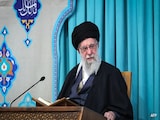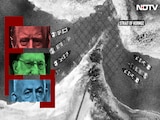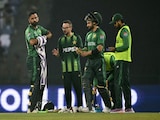- Telangana objected to the Godavari-Banakacherla link project on legal and procedural grounds
- Central agencies have raised objections and rejected the project proposal
- The project alters Polavaram operations and affects Telangana’s rightful share of Godavari water
Ahead of a crucial meeting of the chief ministers of Andhra Pradesh and Telangana to discuss inter-state river water issues, the Telangana Government has formally lodged a strong objection to the inclusion of the Godavari-Banakacherla link project on the agenda.
In a sharply worded letter addressed to the Secretary, Ministry of Jal Shakti, Government of India, Telangana's Chief Secretary asserted that any discussion on the project at this juncture is "unequivocally premature and procedurally untenable" due to numerous legal and procedural violations.
The meeting, convened by the Union Ministry of Jal Shakti on Wednesday afternoon, aimed to facilitate dialogue between the two Telugu states.
The Telangana government requested that the agenda for the upcoming meeting be revised, given the lack of statutory clearances and ongoing violations of binding legal provisions and tribunal awards.
It sought to defer any discussion on the Godavari-Banakacherla link project until all statutory requirements, inter-state consultations, and clearances are fully complied with and all objections are resolved.
Telangana also reiterated its request for its own outstanding issues and proposals to be duly included in the agenda.
On Tuesday, Andhra Pradesh Chief Minister Chandrababu Naidu met Union Home Minister Amit Shah and discussed the project. Mr Naidu said the project only seeks to divert 200 TMC of surplus waters to drought-prone areas, and as the last riparian state, Andhra Pradesh should have the right to do so.
Telangana's Objections
Telangana's letter meticulously outlined a series of profound objections to the Godavari-Banakacherla link project. It argued that the project fundamentally violates the 1980 Godavari Water Disputes Tribunal (GWDT) Award and the Andhra Pradesh Reorganisation Act, 2014. It contends that the project proposes to alter water allocations and project operations without the mandatory consultation and consent of all co-basin states, as required by the GWDT Award (Annexures G and H) and the Reorganisation Act (Sections 85(8)(d) and 90). The proposal to divert water beyond the 80 TMC limit at 75% dependability would also trigger mandatory sharing among all basin states, which has not been addressed.
The Telangana government highlighted the absence of crucial statutory clearances from key central agencies. The project reportedly lacks approvals from the Central Water Commission (CWC), Godavari River Management Board (GRMB), Krishna River Management Board (KRMB), and the Apex Council. These clearances are mandated under the AP Reorganisation Act, 2014, and the GWDT Award.
Telangana stated that the Pre-Feasibility Report (PFR) submitted by Andhra Pradesh suffers from "critical data gaps and methodological deficiencies," particularly concerning water availability assumptions and technical feasibility. The CWC itself has raised fundamental questions regarding water availability computations and the need for a simulation study.
The state also said the Expert Appraisal Committee (EAC) of the Ministry of Environment, Forest and Climate Change (MoEF&CC) has already rejected the project proposal, citing violations of legal and procedural requirements. Furthermore, the parent Polavaram project, from which 200 TMC of floodwaters are proposed to be diverted, faces unresolved submergence issues in Odisha and Chhattisgarh, which are sub judice, making any linked diversion proposal premature. The project has not obtained environmental clearance.
Telangana asserted that the proposed diversion of 200 TMC of floodwaters from Polavaram is unilateral, fundamentally alters the operation schedule of the Polavaram Project, and directly impacts Telangana's rightful share of Godavari water, especially for its drought-prone regions.
Objections By Central Agencies:
Telangana's letter also noted that its objections are echoed by various Government of India agencies and statutory bodies:
It said the Polavaram Project Authority (PPA) has indicated that the proposed 200 TMC diversion is not part of the approved Detailed Project Report (DPR) of Polavaram and requires a comprehensive study and compliance with the tribunal awards. It said the diversion could only be considered after the Polavaram Project's completion to Full Reservoir Level and submission of a revised DPR.
In the letter, it also said the Godavari River Management Board (GRMB) highlighted that the diversion alters the scope and operation schedule of the Polavaram Project, requiring prior consultation and written consent from all co-basin states as per the GWDT Award. It also stressed the absence of a mutually agreed-upon apportionment of Godavari waters between the two states.
Telangana said the Central Water Commission (CWC) has questioned water availability assumptions in the PFR, demanding accurate dependability computations and a simulation study to establish technical feasibility.
It also said the Expert Appraisal Committee had returned the proposal due to potential GWDT Award violations and the necessity of inter-state issue resolution and clearances from CWC before further processing.















